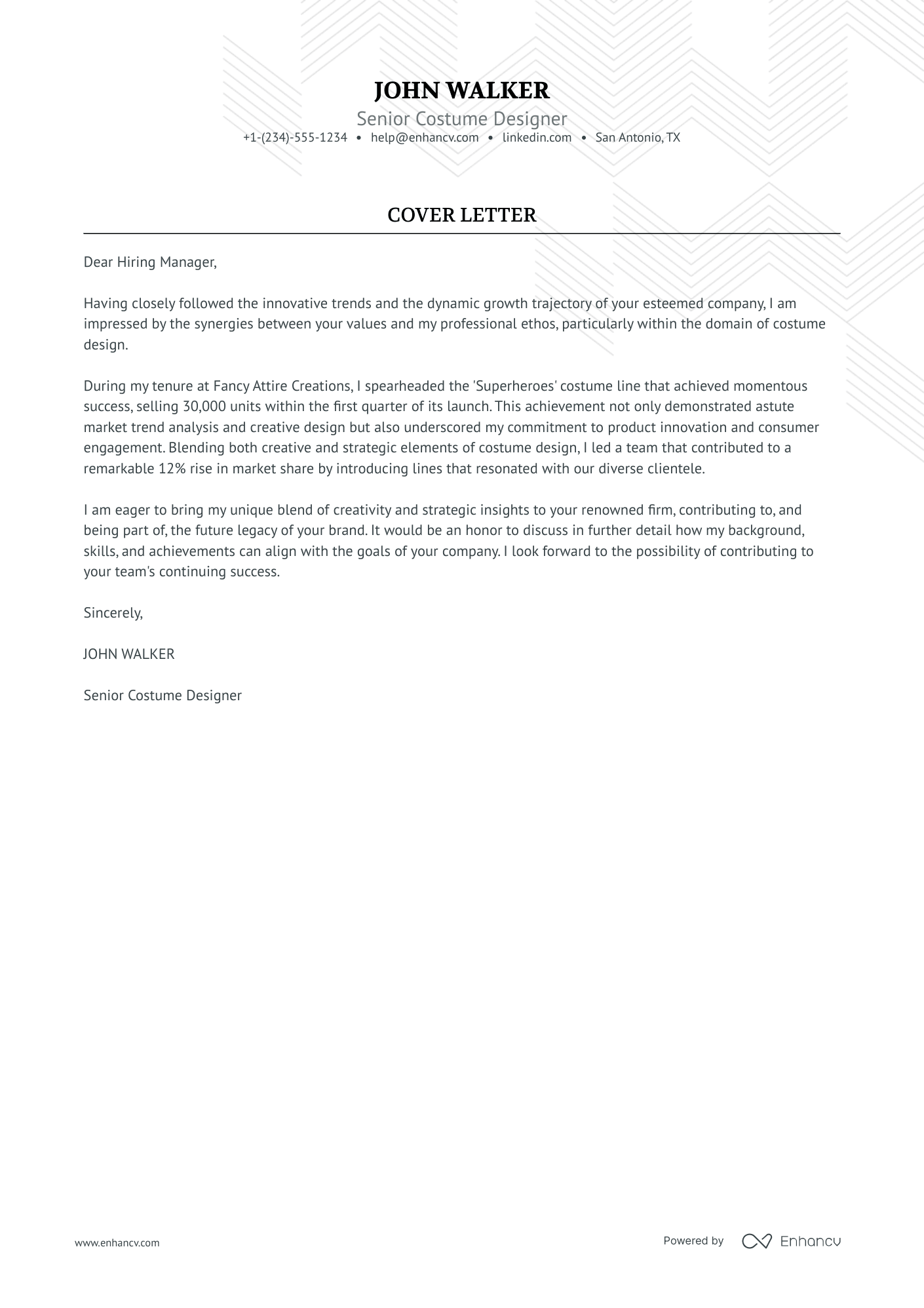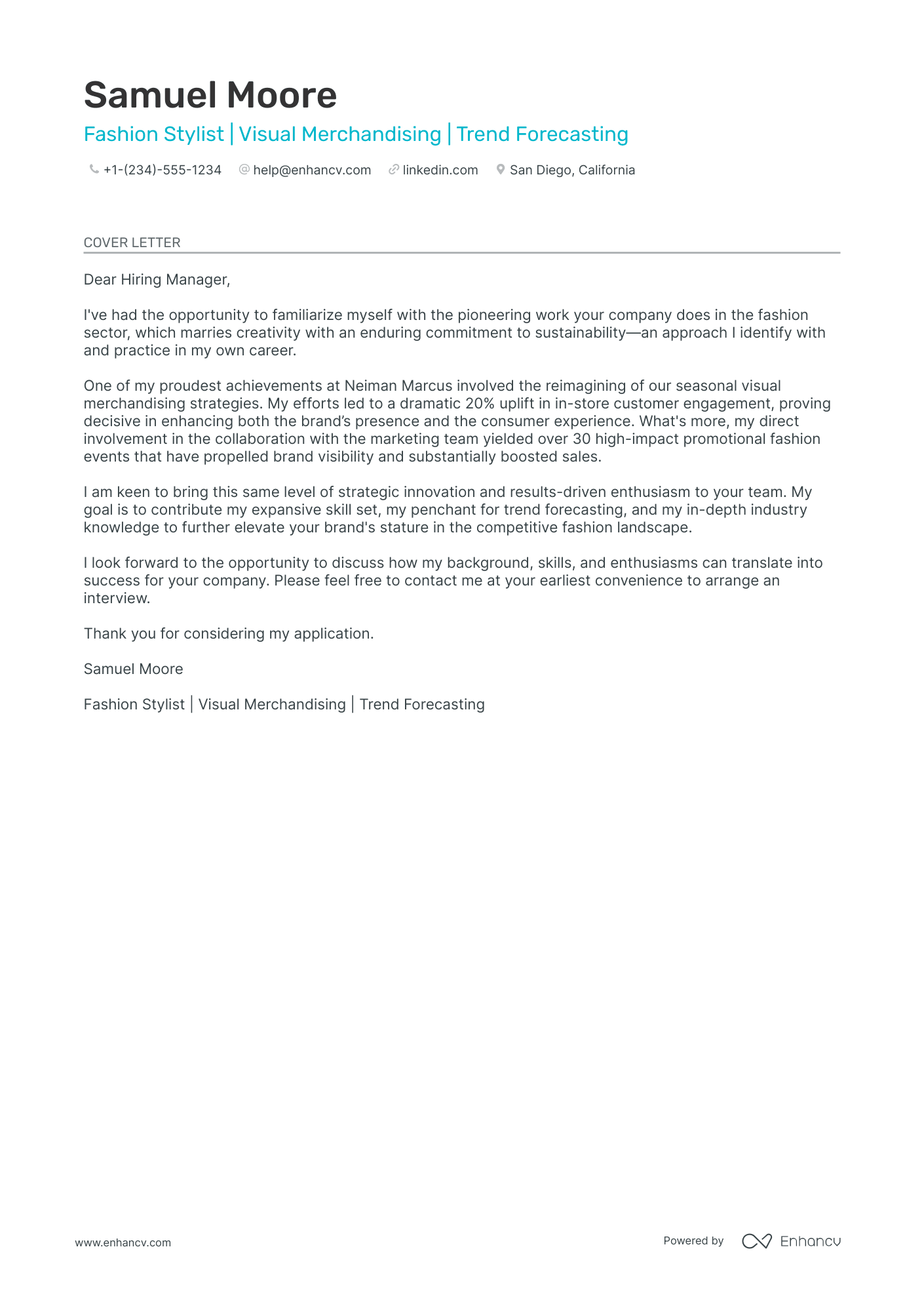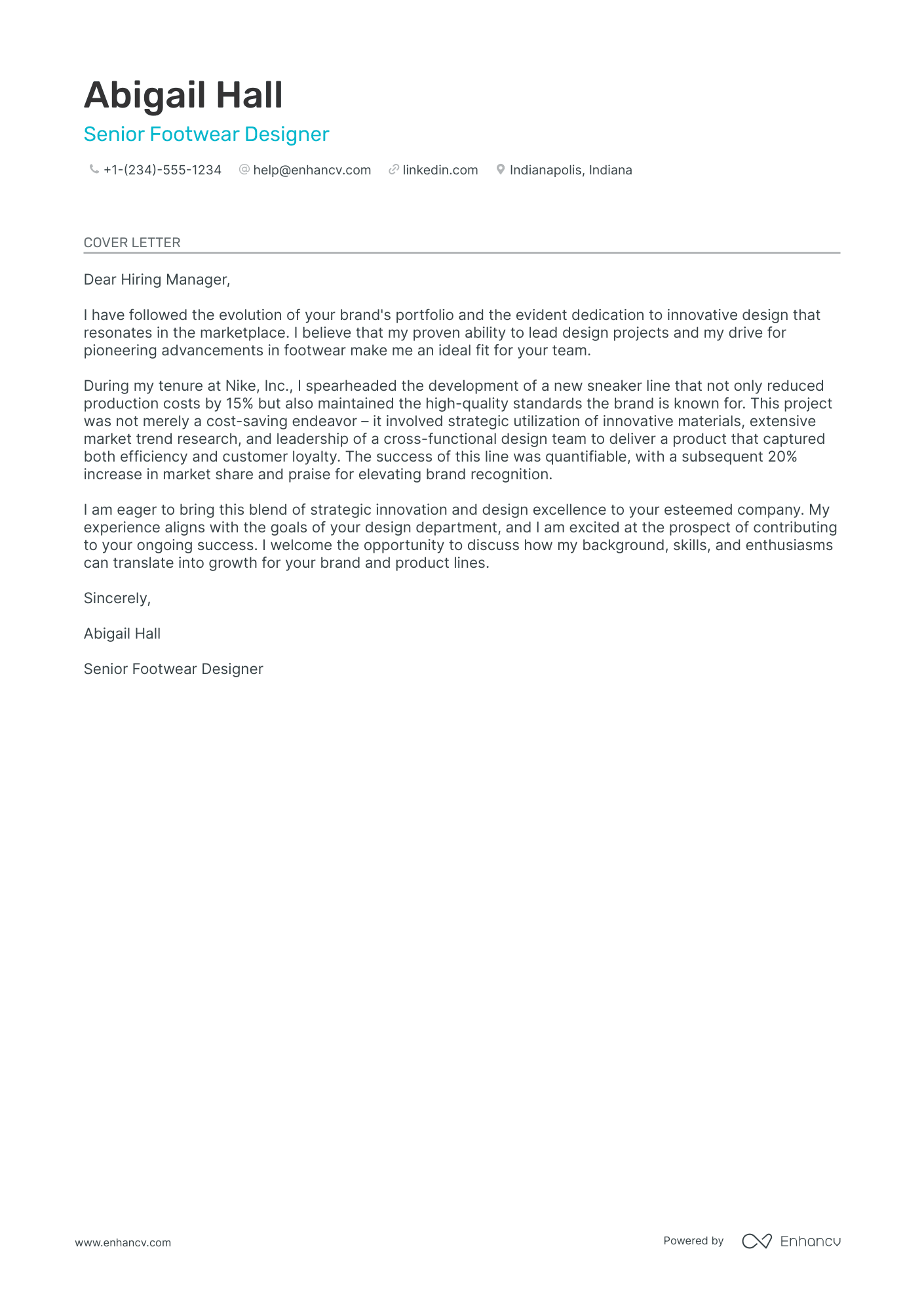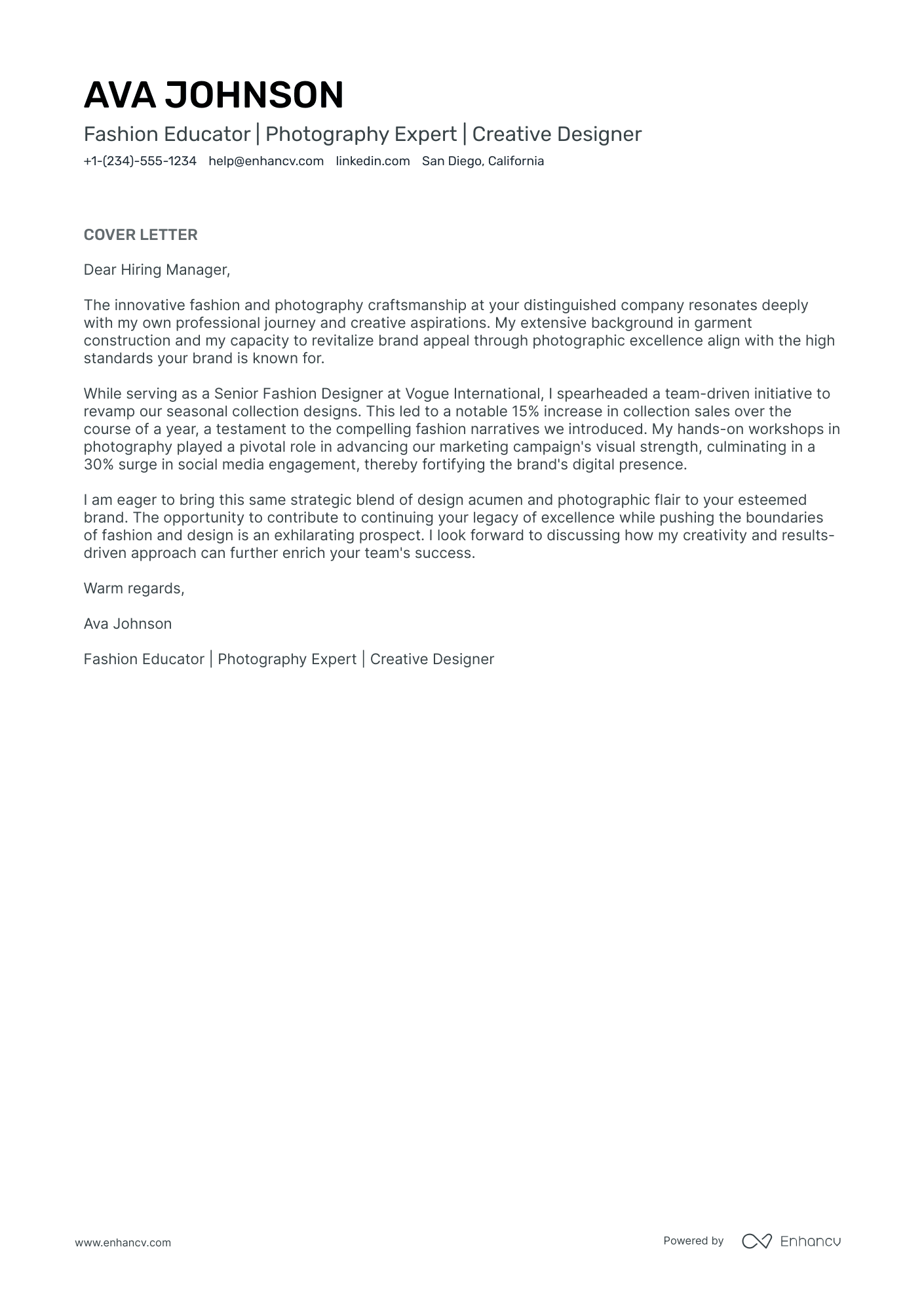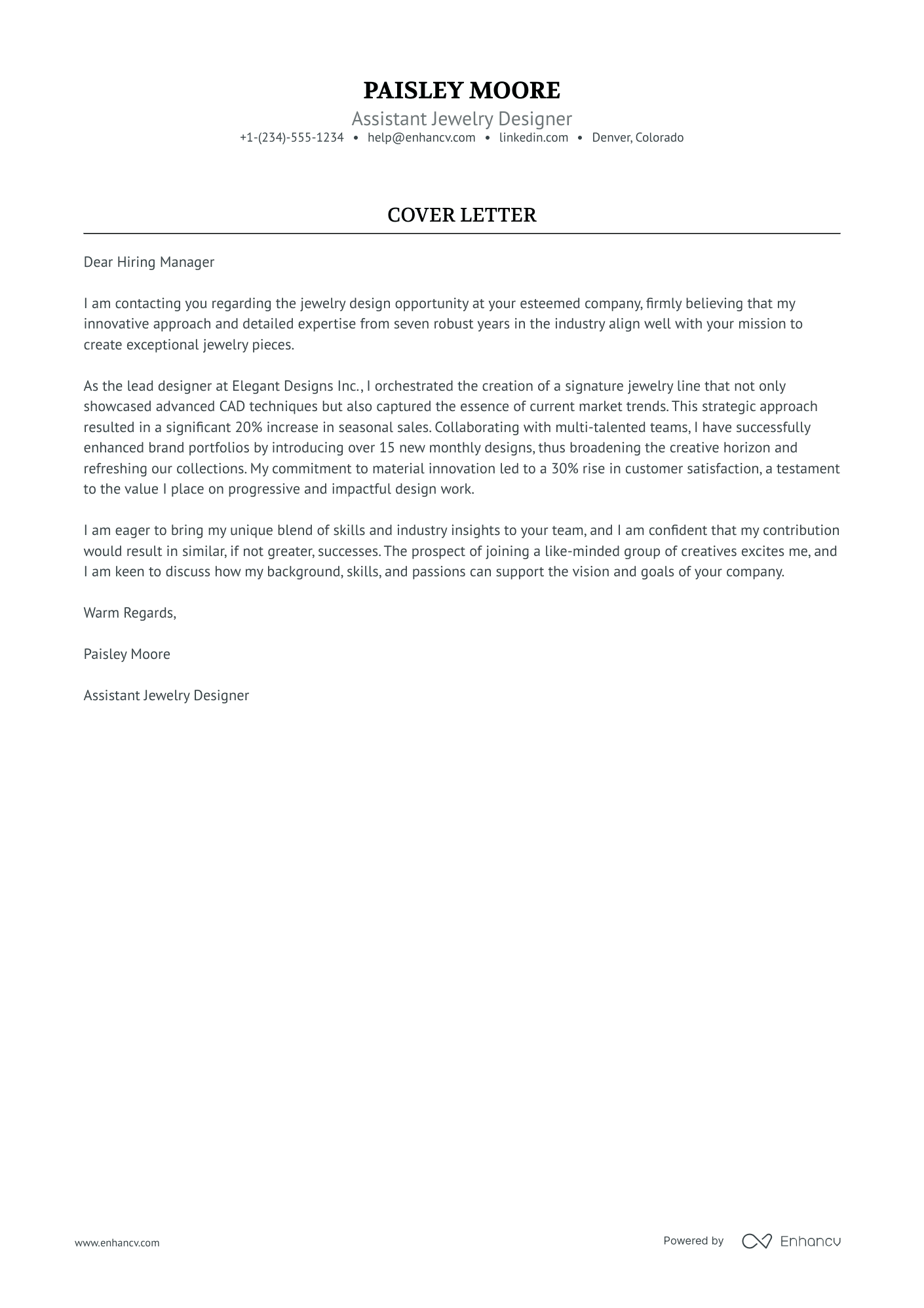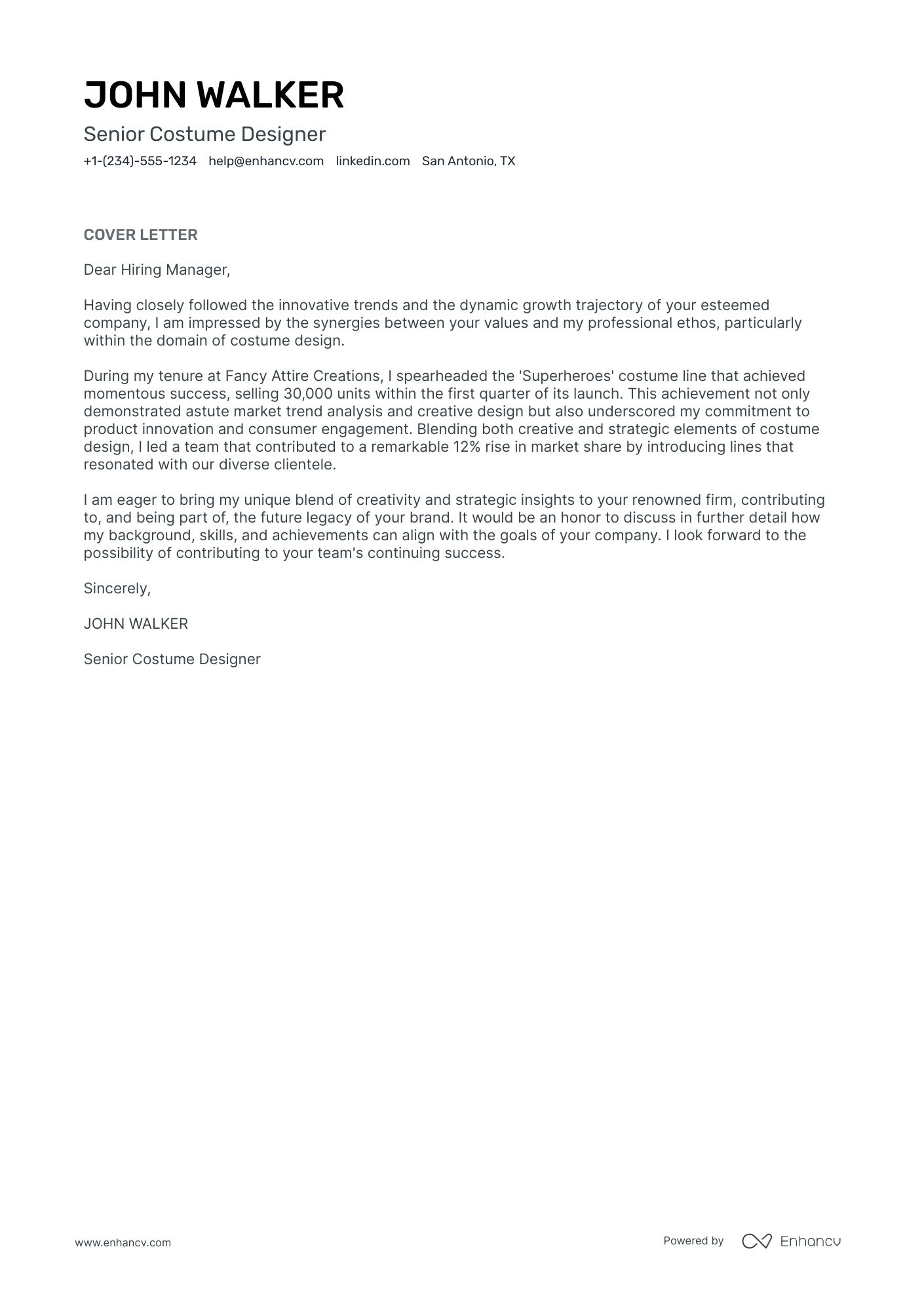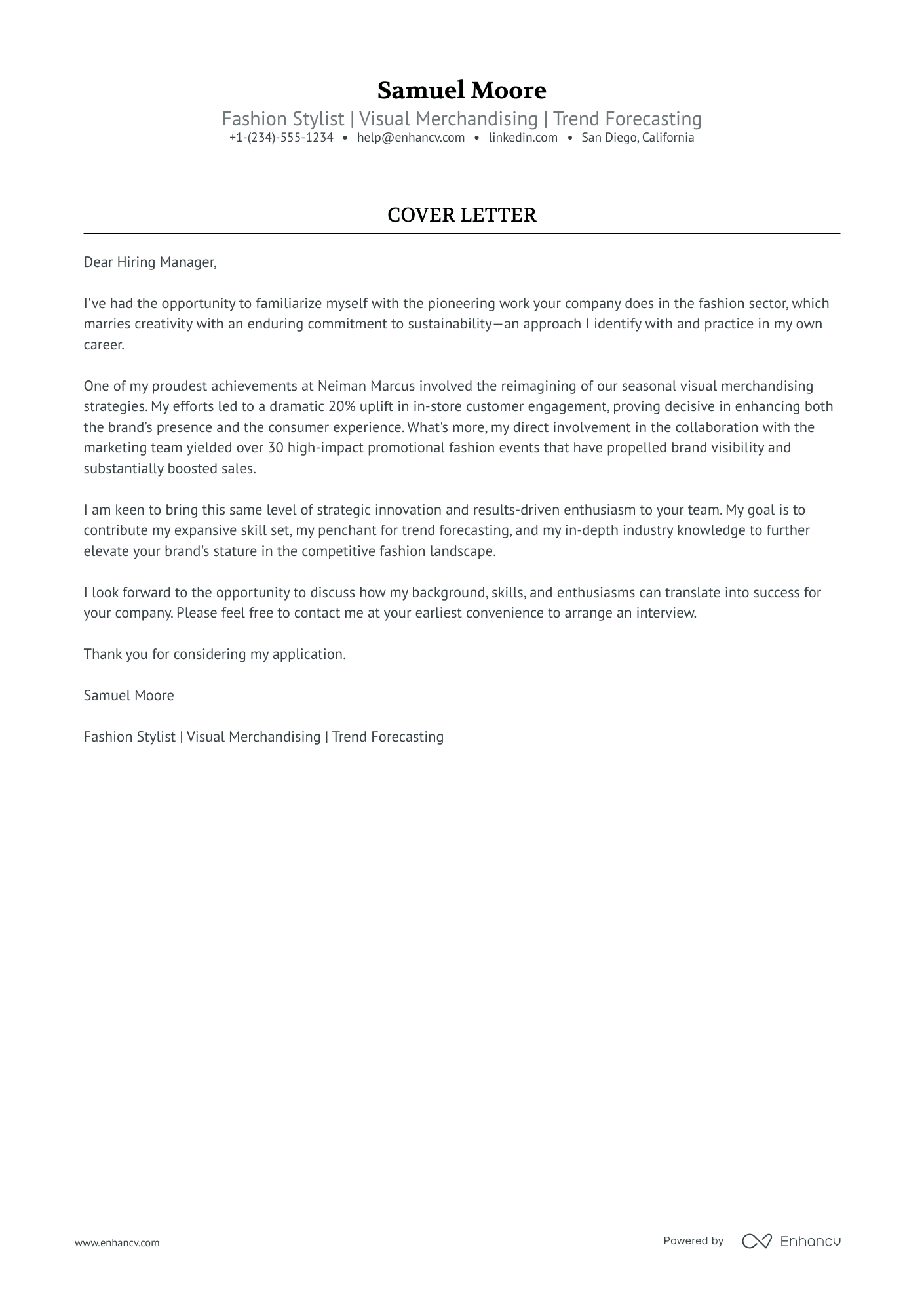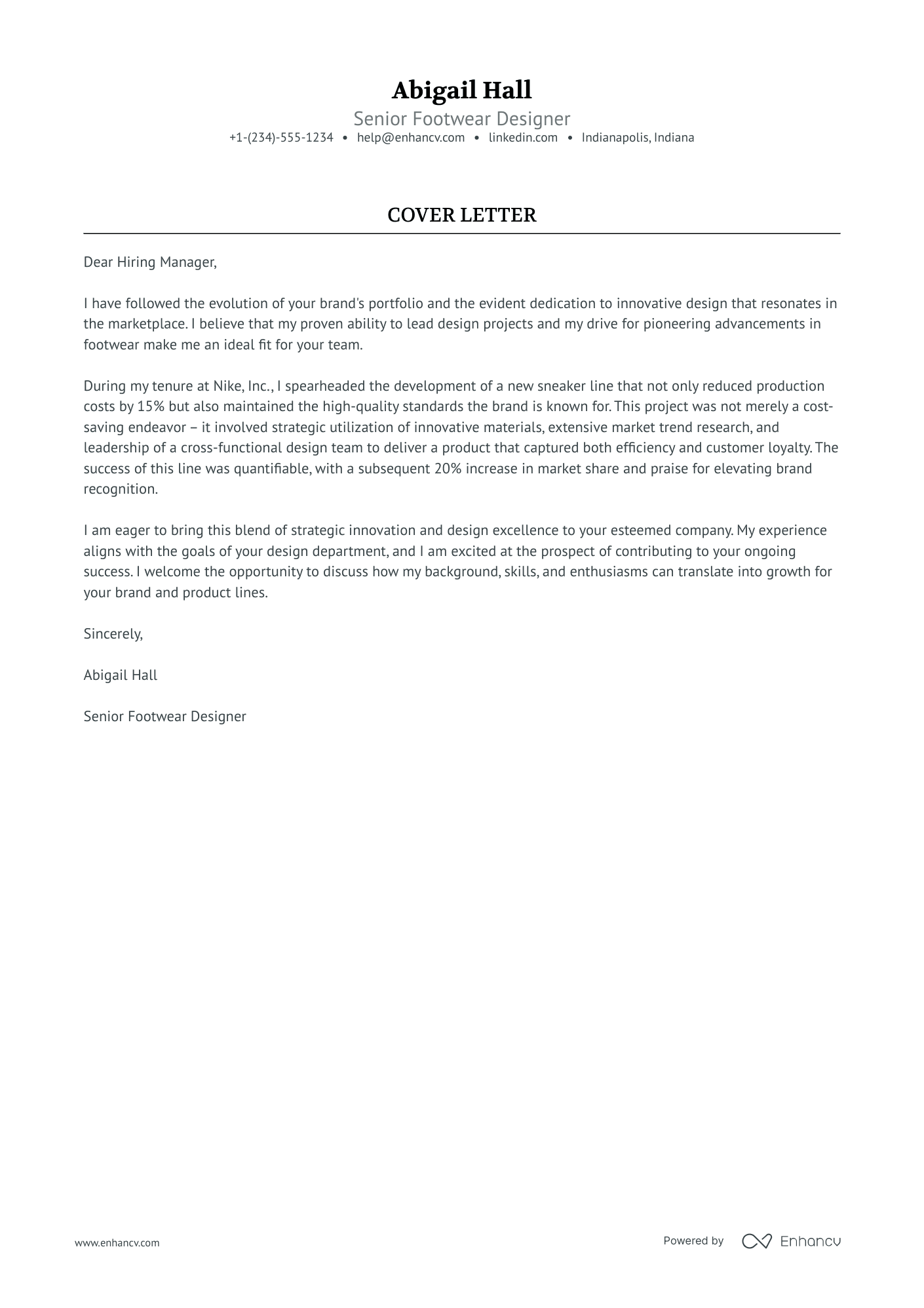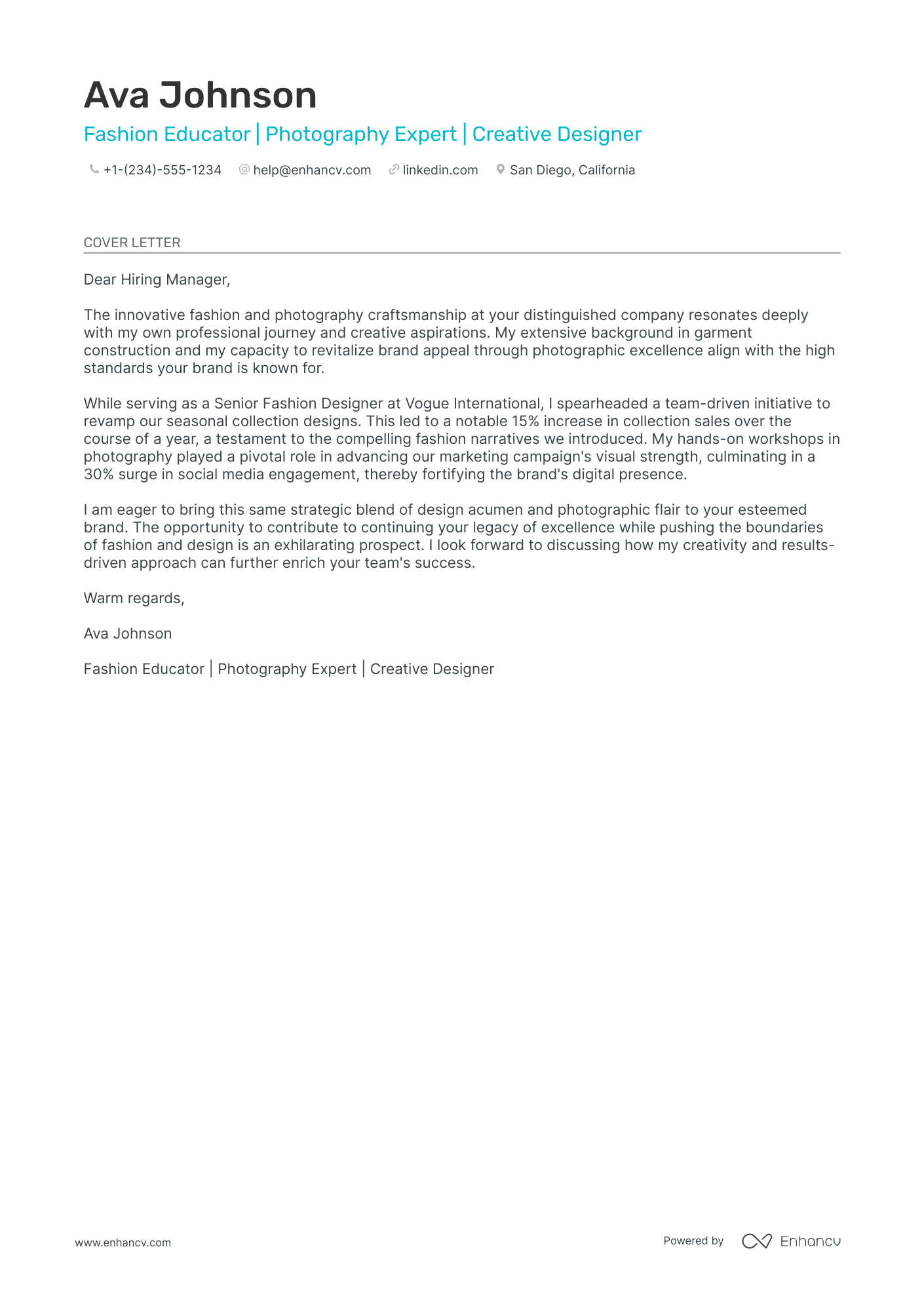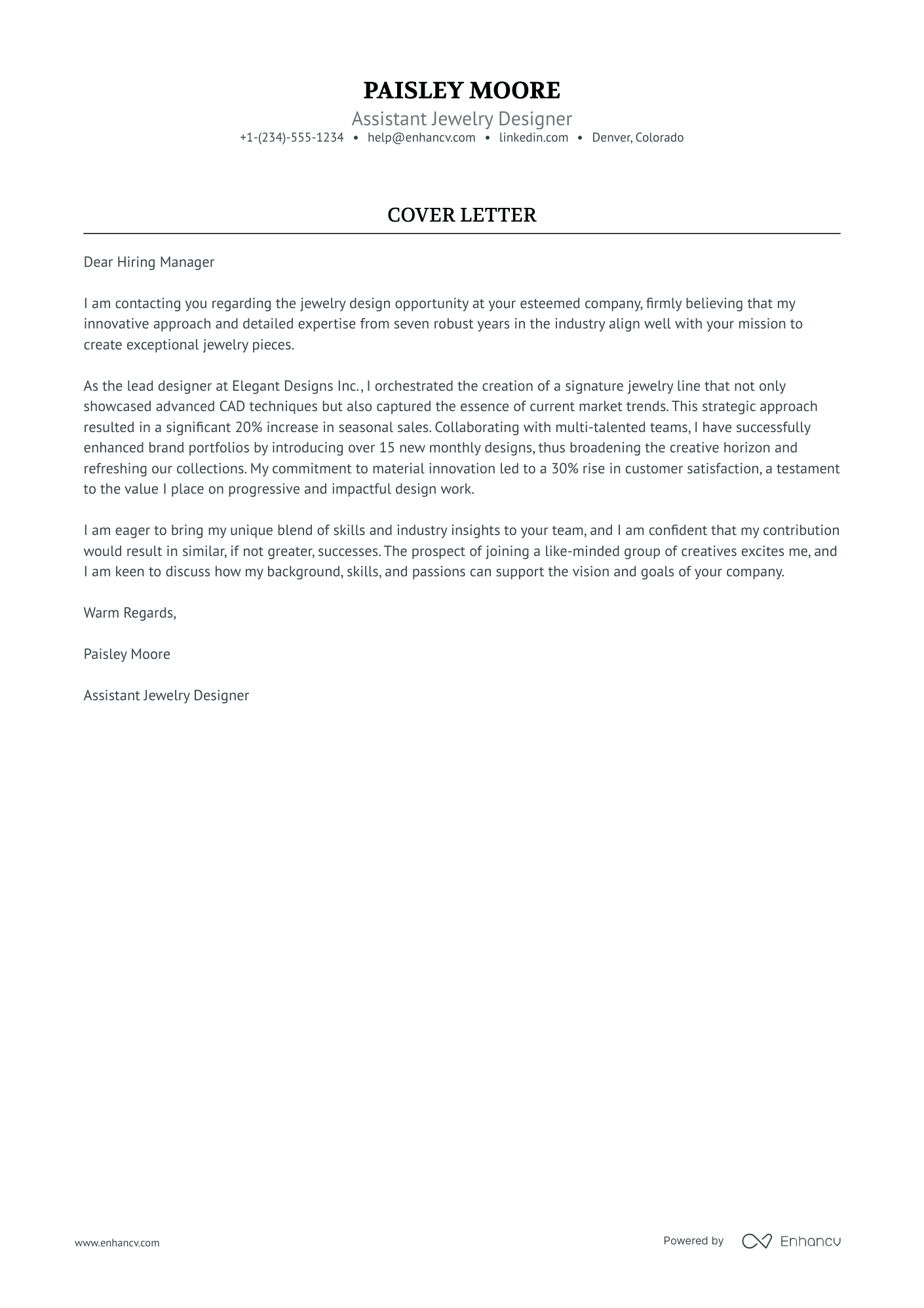Embarking on the pursuit of your dream job in fashion design can be thrilling, yet penning the perfect cover letter often becomes a stumbling block. You may find, deep into job applications, the sudden need to craft a narrative beyond your resume—one that showcases a crowning professional achievement without echoing what's already listed. Striking a balance between formality and originality, all in under one page, is key. Let's tackle these hurdles and make your cover letter as stylish as your designs.
- Writing the essential fashion designer cover letter sections: balancing your professionalism and personality;
- Mixing storytelling, your unique skill set, and your greatest achievement;
- Providing relevant (and interesting) information with your fashion designer cover letter, despite your lack of professional experience;
- Finding the perfect format for your[ fashion designer cover letter, using templates from industry experts.
Leverage the power of Enhancv's AI: upload your resume and our platform will map out how your fashion designer cover letter should look, in mere moments.
If the fashion designer isn't exactly the one you're looking for we have a plethora of cover letter examples for jobs like this one:
- Fashion Designer resume guide and example
- Senior Art Director cover letter example
- Web Designer cover letter example
- Architectural Designer cover letter example
- Junior UX Designer cover letter example
- Sound Designer cover letter example
- Creative Graphic Designer cover letter example
- Interactive Designer cover letter example
- UX UI Designer cover letter example
- Brand Designer cover letter example
- Creative Services Manager cover letter example
Drop your resume here or choose a file.
PDF & DOCX only. Max 2MB file size.
Fashion designer cover letter example
TIMOTHY DUNCAN
New York, NY
+1-(234)-555-1234
help@enhancv.com
- Highlighting relevant experience and success: The cover letter emphasizes the candidate's direct experience in the fashion industry as a designer and the ability to drive sales through design excellence. Mentioning a specific achievement, such as designing a best-selling brand, provides tangible evidence of success and expertise in fashion design.
- Understanding the brand's vision: The candidate shows an understanding of and alignment with the potential employer's brand, suggesting that their skills would complement the existing team. This shows that they have researched the company and are genuinely interested in contributing to its goals.
- Emphasizing the combination of creativity and commercial savvy: The candidate references their ability to balance artistic expression with commercial acumen, a critical skill for success in fashion design where marketability is just as important as creativity.
- Building and leveraging relationships: The cover letter showcases the candidate's skills in cultivating relationships with suppliers that have a direct positive impact on revenue, an important aspect of the fashion business often overlooked by creative professionals.
What are the basics of the design or format of your fashion designer cover letter?
To start, here's a reminder for you: the Applicant Tracker System (or software that is used to assess candidate profiles), won't be reading your fashion designer cover letter.
Recruiters enjoy reading fashion designer cover letters with a standardized format that uses:
- the same font as the resume (e.g. modern ones like Raleway or Volkhov are prefered over the clichéd Times New Roman or Arial);
- single spacing to keep the content concise and organized (this is all ready for you in our cover letter templates);
- a one-inch margin to wrap around the text, like in our cover letter builder;
- PDF as a file format, as it allows your design (and visual element) to stay the same.
Finally, we can't go on without mentioning the key sections of your fashion designer cover letter.
In the top one-third, make sure to include a header (with your contact information, name, role, and date), a salutation, and an introduction.
Next, follows the heart and soul of your fashion designer cover letter or its body.
End your fashion designer cover letter with a closing paragraph and, if you wish, a signature.
Maximize your efficiency! With our free cover letter generator, you’ll have a great letter in moments.
The top sections on a fashion designer cover letter
- Header: Include your contact information, the date, and the employer’s details, which ensures the recruiter can easily identify you and reach out after being impressed by your qualifications.
- Greeting: A personalized greeting shows that you have done your research and are genuinely interested in working with the specific fashion house or brand, rather than sending out generic applications.
- Introduction: Introduce yourself with a strong statement that highlights your passion for fashion design and any signature approach or philosophy you have, as this immediately grabs the recruiter's attention.
- Body: Discuss your previous design experience, noteworthy accomplishments, and how they align with the goals and aesthetic of the brand to which you are applying, showing clear relevance and potential contribution.
- Closing: Conclude by expressing your enthusiasm for potentially contributing to the brand's success, an invitation to review your attached portfolio, and a polite call to action for an interview to discuss the opportunity further.
Key qualities recruiters search for in a candidate’s cover letter
- Strong creative vision and unique design aesthetic: Critical for creating compelling collections and setting the designer apart in a competitive industry.
- Technical proficiency in fashion design software: Necessary for creating accurate and detailed designs, technical sketches, and communicating ideas effectively.
- Knowledge of textiles, fabrication, and garment construction: Essential for creating high-quality, feasible designs and for making informed decisions throughout the design process.
- Trend forecasting abilities: Important for anticipating market trends and consumer preferences to design relevant and appealing fashion items.
- A robust portfolio showcasing diverse design work: Demonstrates versatility, craftsmanship, and the evolution of the designer's personal style and skills.
- Experience with managing design projects from concept to production: Shows capability in bringing designs to life, collaborating with teams, and ensuring timely delivery of finished products.
Personalizing your fashion designer cover letter salutation
Always aim to address the recruiter from the get-go of your fashion designer cover letter.
Use:
- the friendly tone (e.g. "Dear Paul" or "Dear Caroline") - if you've previously chatted up with them on social media and are on a first-name basis;
- the formal tone (e.g. "Dear Ms. Gibbs" or "Dear Ms. Swift") - if you haven't had any previous conversation with them and have discovered the name of the recruiter on LinkedIn or the company website;
- the polite tone (e.g. "Dear Hiring Manager" or "Dear HR Team") - at all costs aim to avoid the "To whom it may concern" or "Dear Sir/Madam", as both greetings are very old-school and vague.
List of salutations you can use
- Dear Hiring Manager,
- Dear [Company Name] Team,
- Dear [Department Name] Recruiter,
- Dear Mr./Ms. [Last Name],
- Dear [First Name] [Last Name],
- Dear [Job Title] Search Committee,
What to include in those first two sentences, or your fashion designer cover letter introduction
Have you ever wondered what the best way is to present your profile in the fashion designer cover letter introduction?
There's no right or wrong answer if you're being concise and authentic to yourself.
Some professionals start their fashion designer cover letter by:
- congratulating the company - focusing on something impressive, whether that's an award, an industry-leading project, or a key event;
- aligning their passion for the field or industry with the job - if you're enthusiastic about what you do, you'd thus grow your skill set and value as a professional.
The middle or body of your fashion designer cover letter body: a great instrument to tell a story
Now that you've set the right tone with the greeting and introduction of your fashion designer cover letter, it's time to get down to business.
Hear us out, the body of your fashion designer cover letter is the best storytelling instrument you have, in your job-hunting arsenal.
Writing the next three to six paragraphs, take the time to reassess the advert to discover job-crucial requirements.
Next, choose one accomplishment that covers those key skills and talents.
Use precisely that achievement to tell an exciting story of how you match the ideal candidate profile.
In the undertones of your story or fashion designer cover letter body, hint at the difference you'd make and sell your application as the perfect one for the job.
Ending your fashion designer cover letter to avoid "sincerely yours"
Yes, this sort of closing statement may work best before your signature.
But you want to give recruiters something more with your fashion designer cover letter ending.
Some professionals choose to go down the path of promises. In a single sentence, they map out what they'd bring about to the role (whether that's a particular technical skill set or personal traits).
Others, decide to be more concrete by thanking recruiters for their time and prompting for their next interview.
Whatever path you choose, remember to always be polite and respectful of the opportunity you've had. Good manners go a long way.
Is it beneficial to mention that you have no experience in your fashion designer cover letter?
Lacking professional experience isn't the end of the world for your fashion designer cover letter.
Just be honest that you may not have had roles in the industry, but bring about so much more.
Like, your transferable skills, attained thanks to your whole work and life experience (e.g. the skills your summer spent working abroad taught you).
Or, focus on what makes you, you, and that one past success that can help you stand out and impress recruiters (think of awards you've attained and how they've helped you become a better professional).
Alternatively, write about your passion and drive to land the job and the unique skill set you would bring to enhance the workplace culture.
Key takeaways
Writing your fashion designer cover letter has never been easier, so remember to:
- Select a fashion designer cover letter template that automatically meets industry formatting (e.g. has one-inch margins, is single-spaced, is in PDF, etc.);
- Make your fashion designer cover letter personal by mentioning the recruiters' first or last name;
- Within the introduction, describe what you like best about the company in no more than two sentences;
- Use your fashion designer cover letter body to tell a story of your greatest achievement, backed up by job-relevant skills and technologies;
- If you have no professional experience, be honest about it in your fashion designer cover letter, but also write about your unique talents.
Fashion Designer cover letter examples
By Role
